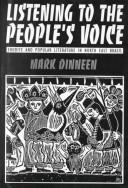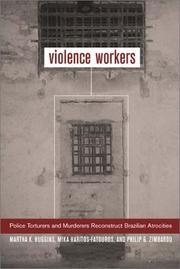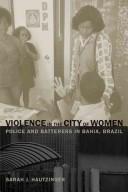| Listing 1 - 9 of 9 |
Sort by
|

ISBN: 0710305451 Year: 1996 Publisher: London New York Kegan Paul International
Abstract | Keywords | Export | Availability | Bookmark
 Loading...
Loading...Choose an application
- Reference Manager
- EndNote
- RefWorks (Direct export to RefWorks)
Book
ISBN: 8577490041 9788577490042 Year: 2006 Volume: 12 Publisher: Rio de Janeiro: Galo Branco,
Abstract | Keywords | Export | Availability | Bookmark
 Loading...
Loading...Choose an application
- Reference Manager
- EndNote
- RefWorks (Direct export to RefWorks)
Concrete poetry, Brazilian --- Brazilian poetry --- Avant-garde (Aesthetics) --- Poésie concrète brésilienne --- Poésie brésilienne --- Avant-garde (Esthétique) --- History and criticism. --- Histoire et critique --- Poésie concrète brésilienne --- Poésie brésilienne --- Avant-garde (Esthétique) --- Concrete poetry, Brazilian - History and criticism. --- Brazilian poetry - 20th century - History and criticism. --- Avant-garde (Aesthetics) - Brazil.
Book
ISBN: 0520965949 0520277724 0520277732 9780520965942 9780520277724 9780520277731 Year: 2016 Publisher: Oakland, California
Abstract | Keywords | Export | Availability | Bookmark
 Loading...
Loading...Choose an application
- Reference Manager
- EndNote
- RefWorks (Direct export to RefWorks)
Latin America is home to emerging global powers such as Brazil and Mexico and has important links to other titans including China, India, and Africa. Global Latin America examines a range of historical events and cultural forms in Latin America that continue to influence peoples' lives far outside the region. Its innovative essays, interviews, and stories focus on insights from public intellectuals, political leaders, artists, academics, and activists from the region, allowing students to gain an appreciation of the global relevance of Latin America in the twenty-first century.
Regionalism --- Globalization --- Latin America --- Foreign relations. --- Social conditions. --- 21st century. --- academics. --- activists. --- artists. --- brazil. --- brazilian history. --- global economy. --- global history. --- global power. --- global trade. --- historical. --- international history. --- international. --- latin america. --- latin american history. --- latin american. --- latinx. --- mexican history. --- mexico. --- political leaders. --- politics. --- regional history. --- regional.
Book
ISBN: 0520966937 9780520966932 9780520293755 0520293754 9780520293762 0520293762 Year: 2019 Publisher: Oakland, California
Abstract | Keywords | Export | Availability | Bookmark
 Loading...
Loading...Choose an application
- Reference Manager
- EndNote
- RefWorks (Direct export to RefWorks)
This book offers a historical analysis of one of the most striking and dramatic transformations to take place in Brazil and the United States during the twentieth century-the redefinition of the concepts of nation and democracy in racial terms. The multilateral political debates that occurred between 1930 and 1945 pushed and pulled both states towards more racially inclusive political ideals and nationalisms. Both countries utilized cultural production to transmit these racial political messages. At times working collaboratively, Brazilian and U.S. officials deployed the concept of "racial democracy" as a national security strategy, one meant to suppress the existential threats perceived to be posed by World War II and by the political agendas of communists, fascists, and blacks. Consequently, official racial democracy was limited in its ability to address racial inequities in the United States and Brazil. Shifting the Meaning of Democracy helps to explain the historical roots of a contemporary phenomenon: the coexistence of widespread antiracist ideals with enduring racial inequality.
United States --- Race relations --- Political aspects. --- 1930s. --- 1940s. --- 20th century. --- brazil. --- brazilian history. --- coexistence. --- contemporary. --- democracy. --- early 20th century. --- historical analysis. --- identity. --- modern world. --- national identity. --- national. --- nationhood. --- political. --- politics. --- racial democracy. --- racial equality. --- racial identity. --- racial inequality. --- racism. --- racist politics. --- transformation. --- united states history. --- world history. --- Brazil

ISBN: 9786612356865 1282356860 0520928911 1597349798 9780520928916 9781597349796 9780520234475 0520234472 0520234464 9780520234468 6612356863 9781282356863 Year: 2002 Publisher: Berkeley University of California Press
Abstract | Keywords | Export | Availability | Bookmark
 Loading...
Loading...Choose an application
- Reference Manager
- EndNote
- RefWorks (Direct export to RefWorks)
Of the twenty-three Brazilian policemen interviewed in depth for this landmark study, fourteen were direct perpetrators of torture and murder during the three decades that included the 1964-1985 military regime. These "violence workers" and the other group of "atrocity facilitators" who had not, or claimed they had not, participated directly in the violence, help answer questions that haunt today's world: Why and how are ordinary men transformed into state torturers and murderers? How do atrocity perpetrators explain and justify their violence? What is the impact of their murderous deeds-on them, on their victims, and on society? What memories of their atrocities do they admit and which become public history?
Torture --- Political atrocities --- Police brutality --- Atrocities --- Brutality by police --- Excessive force used by police --- Excessive use of force by police --- Police use of excessive force --- Use of excessive force by police --- Police misconduct --- Brutalités policières --- Atrocités politiques --- Police violence --- Violence --- 1980s. --- brazil. --- brazilian history. --- brazilian police. --- brazilian. --- contemporary. --- crime. --- criminals. --- cultural history. --- cultural studies. --- execution. --- government. --- masculinity. --- military history. --- military state. --- modern world. --- murder. --- police violence. --- power. --- public history. --- reconstruction. --- social history. --- social studies. --- south america. --- torture. --- world history.
Periodical
ISSN: 15174689 19831463
Abstract | Keywords | Export | Availability | Bookmark
 Loading...
Loading...Choose an application
- Reference Manager
- EndNote
- RefWorks (Direct export to RefWorks)
Brazil. --- Brazil --- Brésil --- History --- Periodicals. --- Histoire --- Périodiques --- historiography --- Brazilian history --- al-Barāzīl --- Barāzīl --- Brasil --- Brasile --- Brasilië --- Brasilien --- Brazili --- Brazili Federativlă Respubliki --- Brazilia --- Brazilië --- Brazilii︠a︡ --- Brazilii︠a︡ Federativ Respublikaḣy --- Braziliya --- Braziliya Federativ Respublikası --- Brazilská federativní republika --- Brazylia --- Brésil --- Federale Republiek van Brasilië --- Federative Republic of Brazil --- Federativna republika Brazil --- Federativna republika Brazilii︠a︡ --- Federat︠s︡iėm Respublikė Brazil --- Fedėratyŭnai︠a︡ Rėspublika Brazilii︠a︡ --- Gweriniaeth Ffederal Brasil --- Pa-hsi --- Pa-se --- Pa-se Liân-pang Kiōng-hô-kok --- Pederatibong Republika sa Brasil --- Pindorama --- República Federal del Brasil --- Republica Federale di u Brasile --- Republica Federativa del Brazil --- República Federativa do Brasil --- Rèpublica fèdèrativa du Brèsil --- Republik Kevreel Brazil --- République fédérative du Brésil --- Tantasqa Republika Wrasil --- Tetã Pindorama --- Wrasil --- Brasili --- Brazilii͡ --- Brazilii͡a Federativ Respublikaḣy --- Federale Republiek van Brasili --- Federativna republika Brazilii͡ --- Federat͡siėm Respublikė Brazil --- Fedėratyŭnai͡a Rėspublika Brazilii͡ --- Brasilia --- Burajiru --- History of Europe --- brazilian history

ISBN: 1282772260 9786612772269 0520941152 1435611438 9780520941151 9781435611436 9780520252769 0520252764 9780520252776 0520252772 1433708965 9781433708961 9781282772267 Year: 2007 Publisher: Berkeley University of California Press
Abstract | Keywords | Export | Availability | Bookmark
 Loading...
Loading...Choose an application
- Reference Manager
- EndNote
- RefWorks (Direct export to RefWorks)
Brazil's innovative all-female police stations, installed as part of the return to civilian rule in the 1980s, mark the country's first effort to police domestic violence against women. Sarah J. Hautzinger's vividly detailed, accessibly written study explores this phenomenon as a window onto the shifting relationship between violence and gendered power struggles in the city of Salvador da Bahia. Hautzinger brings together distinct voices-unexpectedly macho policewomen, the battered women they are charged with defending, indomitable Bahian women who disdain female victims, and men who grapple with changing pressures related to masculinity and honor. What emerges is a view of Brazil's policing experiment as a pioneering, and potentially radical, response to demands of the women's movement to build feminism into the state in a society fundamentally shaped by gender.
Sex role --- Masculinity --- Family violence --- Policewomen --- Women --- Masculinity (Psychology) --- Sex (Psychology) --- Men --- Gender role --- Sex differences (Psychology) --- Social role --- Gender expression --- Sexism --- Domestic violence --- Household violence --- Interparental violence --- Intrafamily violence --- Violence --- Female police officers --- Police women --- Women police officers --- Police --- Human females --- Wimmin --- Woman --- Womon --- Womyn --- Females --- Human beings --- Femininity --- Femmes --- Policières --- Violence familiale --- Masculinité --- Rôle selon le sexe --- Gender roles --- Gendered role --- Gendered roles --- Role, Gender --- Role, Gendered --- Role, Sex --- Roles, Gender --- Roles, Gendered --- Roles, Sex --- Sex roles --- all female police stations. --- anthropology. --- battered women. --- brazil. --- brazilian culture. --- brazilian history. --- civilian rule. --- domestic violence. --- ethnography. --- female victims. --- feminism. --- gender based violence. --- gender studies. --- gendered power struggles. --- gendered violence. --- in laws. --- masculinity. --- men and women. --- police officers. --- police station. --- police. --- policewomen. --- policing by women. --- policing experiment. --- policing for women. --- salvador de bahia. --- sex and gender. --- social structures. --- violence against women. --- violence. --- women police. --- womens movement.
Periodical
ISSN: 2237101X 15183319
Abstract | Keywords | Export | Availability | Bookmark
 Loading...
Loading...Choose an application
- Reference Manager
- EndNote
- RefWorks (Direct export to RefWorks)
Social conditions --- Brazil --- Brazil. --- History --- al-Barāzīl --- Barāzīl --- Brasil --- Brasile --- Brasilië --- Brasilien --- Brazili --- Brazili Federativlă Respubliki --- Brazilia --- Brazilië --- Brazilii︠a︡ --- Brazilii︠a︡ Federativ Respublikaḣy --- Braziliya --- Braziliya Federativ Respublikası --- Brazilská federativní republika --- Brazylia --- Brésil --- Federale Republiek van Brasilië --- Federative Republic of Brazil --- Federativna republika Brazil --- Federativna republika Brazilii︠a︡ --- Federat︠s︡iėm Respublikė Brazil --- Fedėratyŭnai︠a︡ Rėspublika Brazilii︠a︡ --- Gweriniaeth Ffederal Brasil --- Pa-hsi --- Pa-se --- Pa-se Liân-pang Kiōng-hô-kok --- Pederatibong Republika sa Brasil --- Pindorama --- República Federal del Brasil --- Republica Federale di u Brasile --- Republica Federativa del Brazil --- República Federativa do Brasil --- Rèpublica fèdèrativa du Brèsil --- Republik Kevreel Brazil --- République fédérative du Brésil --- Tantasqa Republika Wrasil --- Tetã Pindorama --- Wrasil --- brazilian history --- modern history --- historiography --- Brasili --- Brazilii͡ --- Brazilii͡a Federativ Respublikaḣy --- Federale Republiek van Brasili --- Federativna republika Brazilii͡ --- Federat͡siėm Respublikė Brazil --- Fedėratyŭnai͡a Rėspublika Brazilii͡ --- Brasilia --- Burajiru --- contemporary history --- ancient history --- medieval history
Book
ISBN: 0520955412 1299854303 9781299854307 9780520955417 9780520276048 Year: 2013 Publisher: Berkeley
Abstract | Keywords | Export | Availability | Bookmark
 Loading...
Loading...Choose an application
- Reference Manager
- EndNote
- RefWorks (Direct export to RefWorks)
Donna M. Goldstein presents a hard-hitting critique of urban poverty and violence and challenges much of what we think we know about the "culture of poverty" in this compelling read. Drawing on more than a decade of experience in Brazil, Goldstein provides an intimate portrait of everyday life among the women of the favelas, or urban shantytowns in Rio de Janeiro, who cope with unbearable suffering, violence and social abandonment. The book offers a clear-eyed view of socially conditioned misery while focusing on the creative responses-absurdist and black humor-that people generate amid daily conditions of humiliation, anger, and despair. Goldstein helps us to understand that such joking and laughter is part of an emotional aesthetic that defines the sense of frustration and anomie endemic to the political and economic desperation among residents of the shantytown.
Marginality, Social --- Poor --- Slums --- Violence --- Sex --- Gender (Sex) --- Human beings --- Human sexuality --- Sex (Gender) --- Sexual behavior --- Sexual practices --- Sexuality --- Sexology --- Violent behavior --- Social psychology --- Disadvantaged, Economically --- Economically disadvantaged --- Impoverished people --- Low-income people --- Pauperism --- Poor, The --- Poor people --- Persons --- Social classes --- Poverty --- Exclusion, Social --- Marginal peoples --- Social exclusion --- Social marginality --- Assimilation (Sociology) --- Culture conflict --- Social isolation --- Sociology --- People with social disabilities --- Economic conditions --- Rio de Janeiro (Brazil) --- Prefeitura da Cidade do Rio de Janeiro (Brazil) --- Rio-de-Zhaneĭro (Brazil) --- Riyo de Zshaneyro (Brazil) --- Río de Xaneiro (Brazil) --- Prefeitura do Rio (Brazil) --- Rio de Žaneiro (Brazil) --- Rio (Brazil) --- Município do Rio de Janeiro (Brazil) --- Municipality of Rio de Janeiro (Brazil) --- Race relations. --- Marginality, Social -- Brazil -- Rio de Janeiro. --- Poor -- Brazil -- Rio de Janeiro. --- Poor -- Brazil -- Rio de Janeiro -- Humor. --- Slums -- Brazil -- Rio de Janeiro. --- Violence -- Brazil -- Rio de Janeiro. --- Sex -- Brazil -- Rio de Janeiro. --- Rio de Janeiro (Brazil) -- Race relations. --- activism. --- black humor. --- black humour. --- brazil. --- brazilian history. --- brazilian society. --- civic. --- class. --- cultural anthropology. --- culture of poverty. --- economic desperation. --- engaging. --- ethnicity. --- ethnography. --- historical. --- history of brazil. --- history. --- joking. --- latin america. --- laughter. --- minority studies. --- page turner. --- political. --- politics. --- postcolonial. --- poverty. --- race. --- realistic. --- retrospective. --- rio de janeiro. --- social abandonment. --- social issues. --- social justice. --- social science. --- sociology. --- south america. --- urban poverty. --- urban shantytowns. --- urbanism. --- violence.
| Listing 1 - 9 of 9 |
Sort by
|

 Search
Search Feedback
Feedback About UniCat
About UniCat  Help
Help News
News